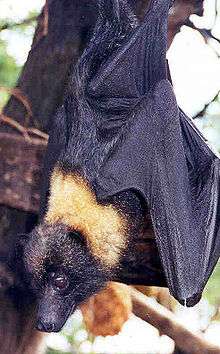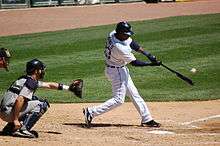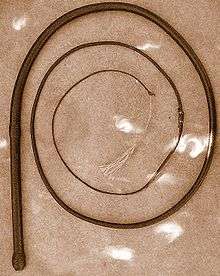Definify.com
Webster 1913 Edition
Bat
Bat
Bat
,Bat
,Webster 1828 Edition
Bat
BAT
,BAT
,BAT
,Definition 2026
bat
bat
English

Noun
bat (plural bats)
- Any of the small, nocturnal, flying mammals of the order Chiroptera, which navigate by means of echolocation.
- 1920, Mary Roberts Rinehart, Avery Hopwood, The Bat, chapterI:
- The Bat—they called him the Bat. Like a bat he chose the night hours for his work of rapine; like a bat he struck and vanished, pouncingly, noiselessly; like a bat he never showed himself to the face of the day.
- 2012, Suemedha Sood, (bbc.co.uk) Travelwise: Texas love bats [sic]
- As well as being worth millions of dollars to the Texan agriculture industry, these mammals are worth millions of dollars to the state’s tourism industry. Texas is home to the world’s largest known bat colony (in Comal County), and the world’s largest urban bat colony (in Austin). Bat watching is a common activity, with the Texas Parks and Wildlife Department offering more bat-viewing sites than anywhere else in the US.
- 1920, Mary Roberts Rinehart, Avery Hopwood, The Bat, chapterI:
- (offensive) An old woman.
- (archaic, slang) A prostitute who prowls in the evening like a bat.
Synonyms
- (flying mammal): chiropter, flindermouse, flittermouse, fluttermouse, flying-mouse, rearmouse/reremouse
Derived terms
Translations
|
|
See also
- Appendix: Animals
- Appendix:English collective nouns
-
 bat on Wikimedia Commons.Wikimedia Commons
bat on Wikimedia Commons.Wikimedia Commons
-
 Chiroptera on Wikispecies.Wikispecies
Chiroptera on Wikispecies.Wikispecies

Etymology 2
Noun
bat (plural bats)
- A club made of wood or aluminium used for striking the ball in sports such as baseball, softball and cricket.
- A turn at hitting the ball with a bat in a game.
- (two-up) The piece of wood on which the spinner places the coins and then uses for throwing them.[1]
- (mining) Shale or bituminous shale.
- (Can we find and add a quotation of Kirwan to this entry?)
- A sheet of cotton used for filling quilts or comfortables; batting.
- A part of a brick with one whole end.
- A stroke; a sharp blow.
- (Britain, Scotland, dialect) A stroke of work.
- (informal) Rate of motion; speed.
- Pall Mall Magazine
- a vast host of fowl […] making at full bat for the North Sea.
- Pall Mall Magazine
- (US, slang, dated) A spree; a jollification.
- (Britain, Scotland, dialect) Manner; rate; condition; state of health.
Synonyms
Derived terms
Translations
|
|
Verb
bat (third-person singular simple present bats, present participle batting, simple past and past participle batted)
- (transitive) to hit with a bat.
- (intransitive) to take a turn at hitting a ball with a bat in sports like cricket, baseball and softball, as opposed to fielding.
- (intransitive) to strike or swipe as though with a bat
- The cat batted at the toy.
Derived terms
|
Translations
|
|
Hyponyms
References
- ↑ Sidney J. Baker, The Australian Language, second edition, 1966, chapter XI section 3, page 242
Etymology 3
Possibly a variant of bate.
Verb
bat (third-person singular simple present bats, present participle batting, simple past and past participle batted)
- (transitive) to flutter: bat one's eyelashes.
- (Britain, dialect, obsolete) To bate or flutter, as a hawk.
- (US, Britain, dialect) To wink.
Usage notes
Most commonly used in the phrase bat an eye, and variants thereof.
Derived terms
Etymology 4
From French bât, from Old French bast, from Vulgar Latin *bastum, form of *bastāre (“to carry”), from Late Greek *bastân, from Ancient Greek βαστάζω (bastázō, “to lift, carry”).[1]
Noun
bat (plural bats)
- (obsolete) packsaddle
Derived terms
Etymology 5
Noun
bat
- Dated form of baht. (Thai currency)
References
- ↑ "batman." Dictionary.com. Dictionary.com Unabridged (v 1.1). Random House, Inc. 2009.
- ↑ “bat” in Douglas Harper, Online Etymology Dictionary (2001).
Anagrams
Aromanian
Alternative forms
Etymology
From Late Latin battō, from Latin battuō. Compare Daco-Romanian bate, bat.
Verb
bat (third-person singular present indicative bati/bate, past participle bãtutã)
Synonyms
Related terms
- batiri/batire
- bãtut, bãtutã
- strãbat
Basque
Article
bat
| < 0 | 1 | 2 > |
|---|---|---|
| Cardinal : bat Ordinal : lehenengo | ||
Numeral
bat
Derived terms
- batasun 'unity'
- bakoitz 'each'
- batzu 'some'
Catalan
Verb
bat
- third-person singular present indicative form of batre
- second-person singular imperative form of batre
French
Pronunciation
- IPA(key): /ba/
Verb
bat
- third-person singular present indicative of battre
Anagrams
German
Pronunciation
- IPA(key): [baːt]
- Rhymes: -aːt
Verb
bat
- first-person singular preterite indicative of bitten
- third-person singular preterite indicative of bitten
Middle Dutch
Pronunciation
- IPA(key): /bat/
Etymology 1
From Old Dutch *bat, *bet, from Proto-Germanic *batiz.
Alternative forms
Adverb
bat
Synonyms
Descendants
- Dutch: bet- only in betovergroot- (“great grand-”) and betweter (“know-it-all”)
Etymology 2
From Old Dutch *bath, from Proto-Germanic *baþą.
Noun
bat n (stem bad-)
Descendants
- Dutch: bad
Min Nan
| trad. | 捌 or 八 |
|---|---|
| simpl. | 捌 or 八 |
Alternative forms
Pronunciation
- IPA(key): [ bat˩˩ ]
Verb
bat (POJ, traditional and simplified 捌 or 八)
See also
References
- 台灣話大詞典 (Tâi-ôan-ōe tōa-sû-tián), ISBN 9573240785, 2000
Old English
Etymology
From Proto-Germanic *baitaz. Related to Old Norse beit. Old Norse bátr (Icelandic: bátur) is a borrowing from Old English; German Boot and Dutch boot are loans from the Middle English descendant.
Pronunciation
Noun
bāt m (nominative plural bātas)
Descendants
Old French
Alternative forms
Etymology
Borrowing from Old English bāt.
Noun
bat m (oblique plural batz, nominative singular batz, nominative plural bat)
References
- (fr) Godefroy, Frédéric, Dictionnaire de l'ancienne langue française et de tous ses dialectes du IXe au XVe siècle (1881) (bat)
Polish

Pronunciation
- IPA(key): /bat/
Noun
bat m inan
- whip (rod)
Declension
Synonyms
Derived terms
- batożyć
Romanian
Verb
bat
- first-person singular present tense form of bate.
- first-person singular subjunctive form of bate.
- third-person plural present tense form of bate.
Serbo-Croatian
Etymology 1
From Proto-Slavic *batъ.
Pronunciation
- IPA(key): /bât/
Noun
bȁt m (Cyrillic spelling ба̏т)
Declension
Etymology 2
From Ottoman Turkish [script needed] (bastı) (Turkish bastı), from [script needed] (basmak) (Turkish basmak).
Pronunciation
- IPA(key): /bâːt/
Noun
bȃt m (Cyrillic spelling ба̑т)
- The tramp of heavy footsteps, as in a military march
- 1939, Čedomir Minderović, Crven je istok i zapad:
- Napred, sve bliže i bliže, / Čuje se koraka bat. / Glas milijona se diže: / Dole fašizam i rat!
- Forward, ever closer and closer, / the tramp of footsteps is heard. / The voice of millions is raised: / Down with fascism and war!
- Napred, sve bliže i bliže, / Čuje se koraka bat. / Glas milijona se diže: / Dole fašizam i rat!
- 1939, Čedomir Minderović, Crven je istok i zapad:
- (rare) The tramp of horses’ hooves
Declension
Etymology 3
Pronunciation
- IPA(key): /bâːt/
Noun
bȃt m (Cyrillic spelling ба̑т)
- Alternative form of bȁht
Declension
References
Tzotzil
Pronunciation
- (Zinacantán) IPA(key): /ɓätʰ/
Verb
bat
- (intransitive) to go
References
- Laughlin, Robert M. (1975) The Great Tzotzil Dictionary of San Lorenzo Zinacantán. Washington: Smithsonian Institution Press.
- Laughlin, Robert M. [et al.] (1988) The Great Tzotzil Dictionary of Santo Domingo Zinacantán, vol. I. Washington: Smithsonian Institution Press.